Namecheap and GoDaddy both have over 20 years in the web hosting game and are trusted by millions of people worldwide to keep their websites up and running.
They offer a range of web services and hosting to enhance your website and hone your online presence. Here, we’ll look at why each company is worth exploring for your business and where they may fall short of your needs based on specific criteria.
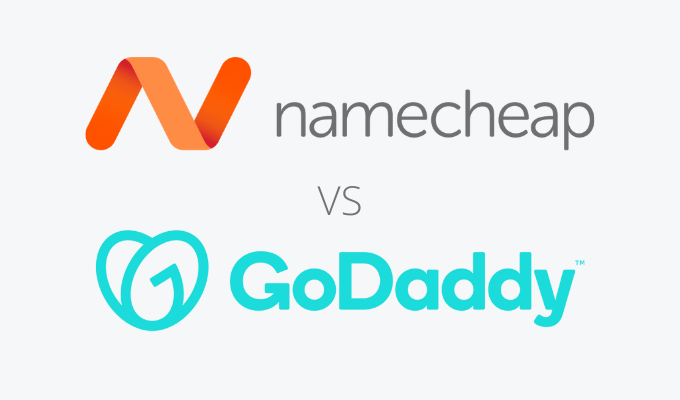
Namecheap and GoDaddy Compared to the Best Web Hosting Providers
Neither Namecheap nor GoDaddy made it onto our top list, but that doesn’t mean they aren’t worth a look. Most people will find that Bluehost has everything they need to get their website online at an affordable price. Sign up for Bluehost for just $2.95 per month and claim your free domain.
- Bluehost—Best overall web hosting
- HostGator—Best for affordable scalability
- Web.com —Best website builder for beginners
- Hostinger—Best long-term pricing
- DreamHost—Best WordPress hosting
- SiteGround—Best ecommerce hosting
- ScalaHosting—Best customer service
- GreenGeeks—Best eco-friendly hosting
- WPEngine—Best managed WordPress hosting
- A2 Hosting—Best for fast & reliable shared hosting
- InMotion—Best VPS hosting
Namecheap vs. GoDaddy High-Level Comparison
Both Namecheap and GoDaddy guarantee a high-quality web hosting experience. GoDaddy is a household name, and it’s one of the easiest platforms out there to start hosting and building your website. Namecheap has a wide variety of hosting offers, discounts, and free trials to get you started.
GoDaddy has registered about eight times more domains than Namecheap. Still, both platforms maintain excellent uptime, and their guarantees prove it. Both platforms are affordable, though you’ll get a few more services included in your plan with GoDaddy than Namecheap.
Both companies have been around for over two decades, and their hosting options reflect their industry experience. Each one offers shared, dedicated, VPS, and managed WordPress hosting. The difference lies in the details of each plan, like GoDaddy’s free SSL certificates and Namecheap’s migration features, which we’ll discuss in depth later in this post.
Products and Services Offered by Namecheap and GoDaddy
GoDaddy and Namecheap have similar hosting packages and services, but each company puts its own spin on its offerings. Along with hosting services, they both offer a wide selection of domain types, and Namecheap has a lot of free security features, including free privacy protection for life. Unfortunately, it doesn’t offer a free SSL for more than a year, and the same goes for GoDaddy.
Namecheap and GoDaddy each offer shared hosting, dedicated hosting, WordPress hosting, and VPS hosting. Namecheap also provides email-only hosting intended specifically for you to create your own mailbox with a professional email address. It even has reseller hosting, so you can sell hosting plans to your client, which GoDaddy doesn’t offer.
GoDaddy’s most unique hosting plan is Windows hosting, which works better for certain types of servers, like SQL and ASP. With the types of hosting packages that GoDaddy and Namecheap share, GoDaddy tends to offer more features. GoDaddy gives you daily backups, a free SSL, free one-click WordPress installation, and more storage.
In comparison, Namecheap gives you more mailboxes. While their actual offerings appear to fall short compared to GoDaddy’s, their service makes up for it with quick migrations, superior customer support, and lower costs.
Company Health and Stability of Namecheap and GoDaddy
Both Namecheap and GoDaddy are extremely stable companies. GoDaddy has over 84 million registered domains, while Namecheap has over 10 million. GoDaddy has been around since 1997, which isn’t much longer than Namecheap, founded in 2000.
GoDaddy has changed CEOs several times, but Namecheap has had the same one almost since the company’s founding, which shows it’s consistent. GoDaddy has raised $800 million in funding, has 28 acquisitions and two investments, and is publicly traded under NYSE: GDDY. Namecheap doesn’t have as much information available regarding its funding, and the company is actually owned by GoDaddy.
Namecheap vs. GoDaddy Pricing Comparison
Both Namecheap and GoDaddy have made names for themselves as some of the more affordable hosting companies in the business. Each offers a wide variety of plans for different types of hosting, but we’ll focus mainly on shared hosting since that’s what most people use for their businesses.
Neither company offers a free hosting plan, but Namecheap is quite a bit cheaper. It starts at $1.97 per month for the first year and increases to $4.48 per month after that. With it, you get a domain name, three websites, 20 GB of storage, and 30 mailboxes with your domain.
GoDaddy’s Economy entry-level package is $6.99 per month and renews at $9.99 per month when you renew. If you don’t want to lock into a one-year plan, that can be a downside, even with the extended discount. Once it renews, you pay double what Namecheap charges, even after the price increase.
At the same time, you get more with GoDaddy’s 25 GB storage, 10 databases, free one-click WordPress installation, daily backups, free domain, and free SSL certificate. Both companies offer more expensive packages and add-ons that you can purchase if you need more features.
Pricing Structure of Namecheap and GoDaddy
GoDaddy and Namecheap are similar in terms of pricing structure. Both bill per month and offer a discount for your first year of hosting services.
GoDaddy has four shared hosting plans, ranging from Economy to Maximum. They start at $6.99, and the most expensive is $17.99 per month. All plans increase in price after the first year by about $5 to $10 per month.
Namecheap offers the Stellar, Stellar Plus, and Stellar Business plans. Even its most expensive is only $4.96 to start, though each one jumps in price by double or more after the first year.
Cost Comparison of Namecheap and GoDaddy
GoDaddy costs almost twice as much as Namecheap but offers more. Namecheap’s cheaper hosting reflects its services, but GoDaddy’s pricing doesn’t always reflect the quality of its services. Namecheap sticks to high-quality essentials, and you get more websites and mailboxes with most plans.
GoDaddy falls short in some areas that may be essential for some users, like its migration services. However, it offers more storage and databases and some free services that Namecheap makes you pay for or doesn’t have.
Namecheap’s Stellar Business plan is the priciest of the shared hosting plans and is made for small businesses. It is closest in cost and features to GoDaddy’s Economy plan. But with GoDaddy, even small businesses should probably start with the Ultimate or Maximum plans that have increased processing power and more storage.
Trials and Guarantees for Namecheap and GoDaddy
GoDaddy doesn’t have any trial services for its web hosting services, but it does give you a one-month free trial for its website builder. You also get its 99.9% uptime guarantee.
Namecheap doesn’t have a free hosting trial either, though it guarantees a full refund if you’re unsatisfied with your web hosting service. It has a 100% uptime guarantee and offers a service extension to make up for any time your website goes down. You can also try its EasyWP Turbo plan free for one month and its Pro email hosting for two months.
Namecheap vs. GoDaddy Core Criteria Comparison
I evaluated GoDaddy and Namecheap based on several criteria that you should look for in any hosting company. Knowing what to look for before you buy helps you make the best hosting decision for your business website by directly comparing each company and how they stack up to others.
Namecheap and GoDaddy aren’t the best hosting options out there, as each has more limits than other platforms, like Bluehost and Dreamhost. Still, based on our research, GoDaddy is better for small or medium businesses that intend to grow. Namecheap works well for small businesses on a budget, but you’ll likely need to switch hosts eventually.
See how Namecheap and GoDaddy compare to other platforms in our review of the best web hosting providers.
Site Uptime—Namecheap Wins
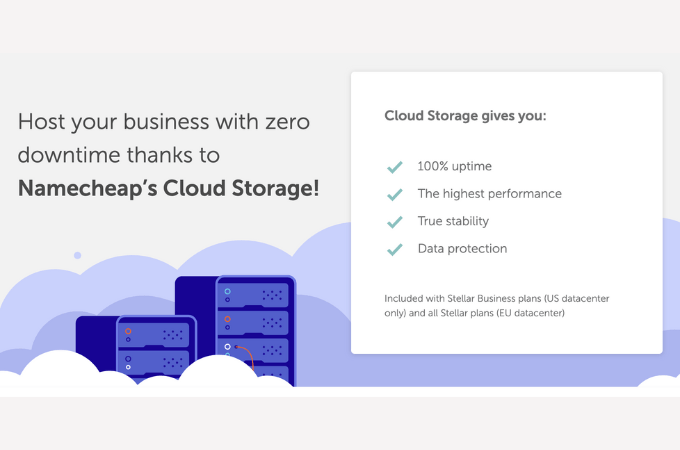
Namecheap has a 100% uptime guarantee for shared and dedicated hosting, and you get a service cycle extension for any amount of time that your website goes down. In general, the company maintains 99.99% uptime.
Its reseller and VPS hosting have a lower uptime guarantee of 99.9%, which can amount to up to nine hours of downtime per year. That said, Namecheap’s uptime rivals many popular hosting platforms.
GoDaddy has a 99.9% uptime guarantee, though they usually maintain much higher than that. It generally sticks around 99.99%, and some tests have put GoDaddy at an average of 13 minutes of downtime per month, which isn’t bad.
Site Speed—GoDaddy Wins
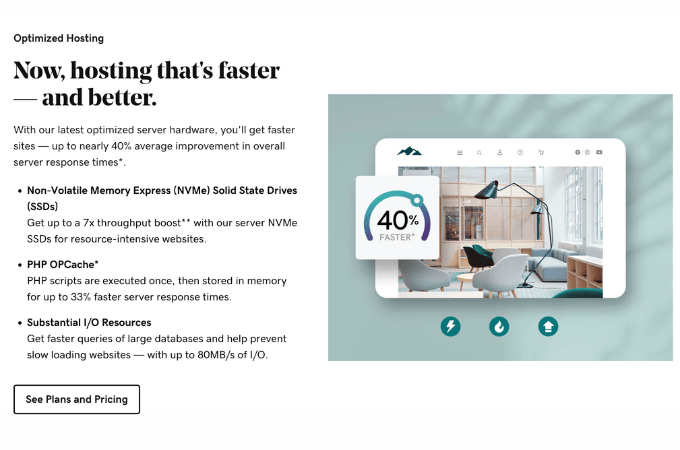
Your website has three seconds to make an impression. Any longer than that, and you risk visitors and potential customers navigating away and choosing your competitor.
GoDaddy has faster-than-average loading speeds and exceeds some hosting companies that did make our top list, including SiteGround. There are faster ones, like DreamHost and Bluehost, but overall, GoDaddy holds its own. It falls around the two-second mark, well within the three-second window.
Namecheap is a little slower than GoDaddy. It still falls within that three seconds most of the time, but most users aren’t impressed. It also doesn’t perform as well if you have a lot of different media on your site. Given how important images, video, and other media is for marketing and engaging visitors, that can be a drawback.
Customer Support—Namecheap Wins
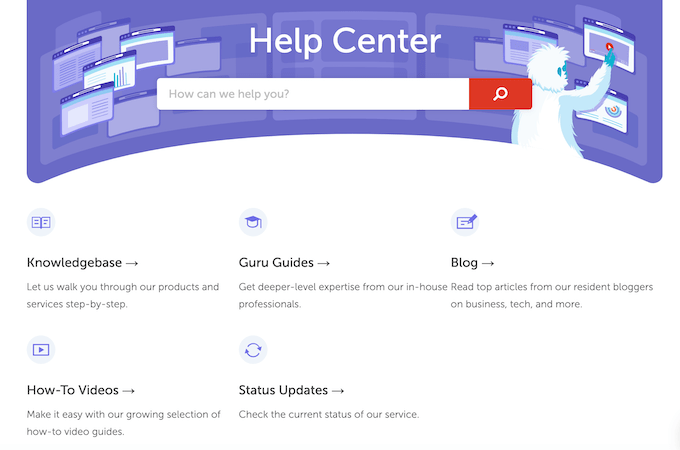
When something goes wrong, you want to know that your hosting company will be attentive and help you resolve issues quickly. You also want them to live up to the support they promise.
GoDaddy has 24/7 customer support, but it also has many complaints about the quality of that service. Customer experiences vary widely here. On average, customers seem to get their problems resolved, but not everyone gets to that resolution quickly, which doesn’t bode well when you need to get your website back online.
Namecheap also has 24/7 customer service. However, it doesn’t have phone support, which GoDaddy does. Still, most customers say the support they receive is good quality, and they get their issues resolved fast.
Traffic Volume—GoDaddy Wins
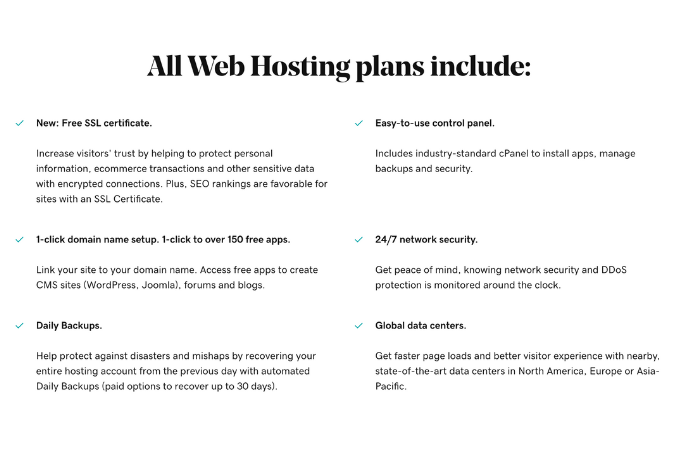
Traffic volume is vital for a growing business, and it factors into your hosting service. You want hosting that has room for you to grow, whether through your current plan or the ability to upgrade.
GoDaddy has unmetered bandwidth for every plan, allowing more room for higher traffic volume. The Ultimate and Maximum plans both provide increased processing power to support higher traffic volumes. Plus, with global data centers, GoDaddy improves the visitor experience and enhances performance with higher traffic volume.
Namecheap has unmetered bandwidth, too. It doesn’t have increased processing power like GoDaddy, but its small business plan supports up to 50,000 visitors per month, putting it on par.
Price—Namecheap Wins

When considering the price, you should factor in a few other variables. If one service is more expensive, what extras are you getting to make up for the price jump? And are the features offered worth paying a little more?
GoDaddy is expensive for hosting, starting at $6.99 per month for one year and $7.99 per month for three years. For the price, it’s not too bad, given how many free features it comes with, but that only applies if you don’t need any extras. GoDaddy will try to upsell you with enhancements for speed, security, and more, and that can drive up the cost quickly, especially if you need those things as your business grows.
Namecheap is cheaper overall than GoDaddy, though its significant discounts only last a year before renewing at a higher cost. However, that cost is still lower than GoDaddy.
Namecheap claims on its website that it won’t give you any unwanted upsells, but it still makes you pay more for things you need. For example, you’ll have to pay for your SSL certificate after the first year, which many other hosting services, including GoDaddy, give you for free.
Migration Features—Namecheap Wins
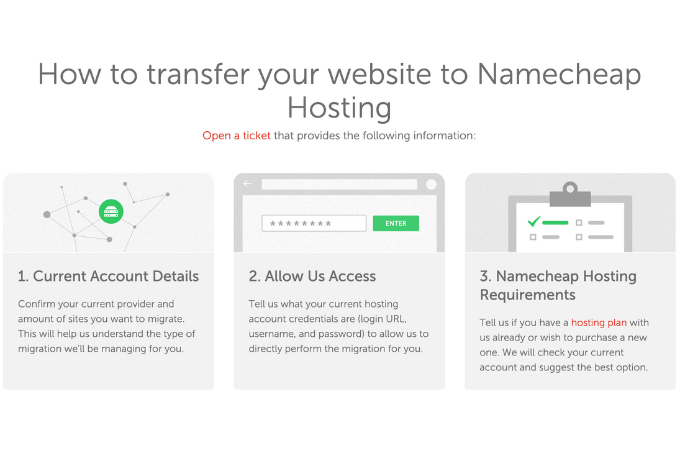
Many hosting services migrate your website for free, and this is one area where Namecheap and GoDaddy differ. Ideally, you want your hosting service to do all the heavy lifting here as fast as possible.
Namecheap’s migration services are some of the best for their efficiency and convenience. Just give Namecheap your website details, and its team will move your site to their platform. And yes, Namecheap’s migration services are free.
Your website credentials are encrypted when you share them with Namecheap’s support team. The company also guarantees it will migrate your site within 24 hours, and you won’t experience more than 15 minutes of downtime. This is a huge plus when transferring your site since it won’t disrupt your business, traffic, or sales.
GoDaddy, can say the same. However the migration can take between 5 to 7 days, which can mean significant disruption to your business.
They don’t offer any guarantees with migration the way Namecheap does. If you’re migrating your site, it’s better to go with the faster and more proactive company.
Managed Hosting—GoDaddy Wins
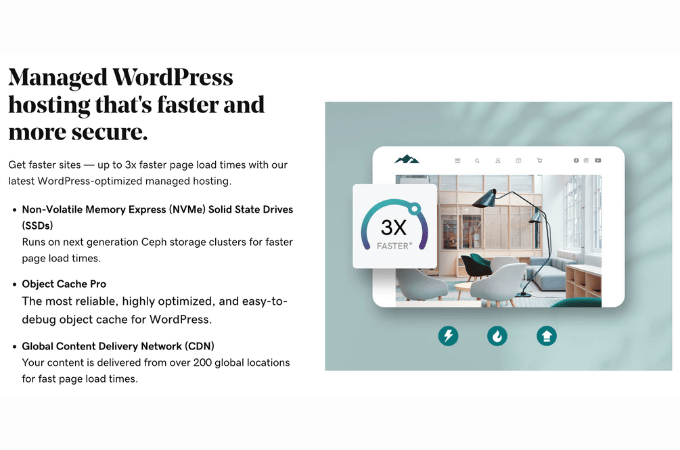
While many businesses go with shared hosting, managed hosting comes with more services. It takes care of the technical aspects of running and maintaining the server throughout the company, and this can make it easier for people without much technical knowledge.
Namecheap offers free managed WordPress hosting for 30 days. After that, it starts at $34.72 for the first year and then doubles. Managed hosting with Namecheap ensures a fast server, and Namecheap makes it easy to run your website without slowdowns since it’s separate from shared hosting.
GoDaddy’s managed WordPress hosting is much cheaper at $11.99 per month for a year, and it only goes up to $12.99 after that. It claims to have website speeds three times faster than shared hosting and integrated optimization tools and malware scans and removal. It also offers a free SSL and domain for your hosting duration.
Final Verdict
Overall, Namecheap is a better value for what it offers. Namecheap has all the basics of a good web host, and though it falls short in a few areas, it makes up for it in others. It still has fast website speeds, excellent uptime, and offers a lot of features for its price.
GoDaddy and Namecheap are similar in their offerings. However, Namecheap stands out for its migration features, which are slightlybetter and more efficient than GoDaddy.
